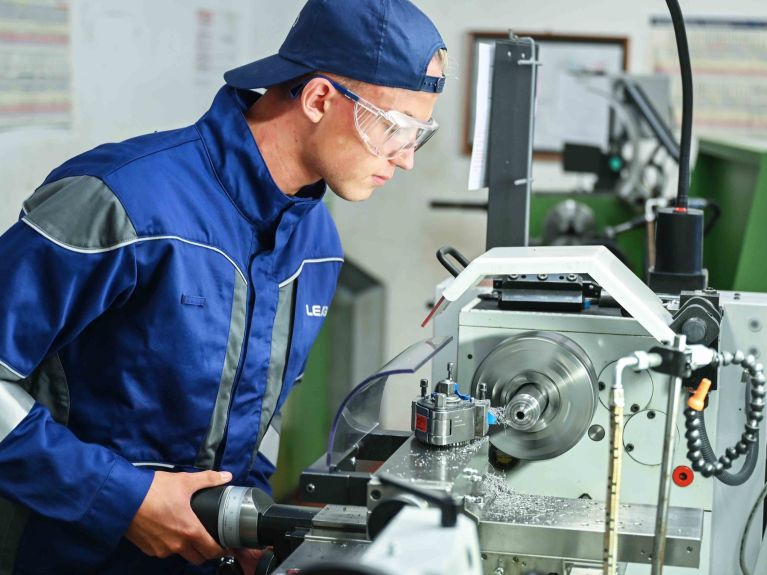Facts about the dual vocational training system
Vocational training in Germany is recognised worldwide. You can discover how it works here.

Dual vocational training in Germany is based on parallel training at the workplace and in school. Here we answer the most important questions about this tried and trusted system.
What is the goal of a dual vocational training programme?
The dual vocational education system aims to provide comprehensive expertise in an occupation that goes beyond simple training on the job – and often goes beyond the work of the training enterprise. Take mechatronics engineers, for example: trainees have to acquire extensive theoretical knowledge – in other words, how does a vehicle function, how does an engine work, how do I identify faults and how can they be repaired – even if they are training in a workshop that specialises in vehicle body work or repairing car windows. They also receive general and specialist vocational instruction at the vocational school (Berufsschule). Trainees are employed and paid by the training enterprise.

Which occupations are officially recognised?
In Germany there are 328 state-recognised training occupations in industry and the skilled trades, public administration, household management, agriculture, maritime transport and the independent professions. Each training occupation must be recognised by the relevant specialist ministry and by the education ministry. This ensures that workplace vocational training is standardised across the country.
How long does a vocational training programme take?
This is laid down in the respective vocational training regulations: depending on the occupation involved, training can take between two-and-a-half and three-and-a-half years.
What qualifications do applicants need?
There are no legally prescribed, compulsory minimum admittance or employment requirements. Which qualifications and/or school certificates are accepted is at the discretion of the training enterprise.

How does training function at the workplace?
Dual vocation training mainly takes place at the workplace with the trainee also attending vocational school one to two days a week. An enterprise is only allowed to offer vocational training if it is authorised to do so by the responsible chamber (for example, the Chamber of Industry and Commerce [IHK] or the Chamber of Crafts). It must employ suitable, qualified trainers and, as a rule, two specialists per trainee.
How does training function at the school?
Trainees attend vocational school for one to two days a week (eight to twelve lessons) or for weeks at a time during periods of block teaching. There they are taught occupation-specific content, as well as the compulsory subjects of German, politics, sport and usually mathematics, English and an elective subject.

What qualifications are awarded?
In addition to an interim exam, there is a final examination (the journeyman’s examination in the skilled trades) that is organised by the relevant chamber; in the case of the IHK, a standardised exam is taken throughout the whole of Germany. On successfully passing the examination, trainees receive a journeyman’s diploma or trade proficiency certificate.
Are there other training paths alongside the dual vocational training system?
Recognised training programmes that lead to state qualifications are offered by specialist vocational schools (Berufsfachschulen) in many sectors. The practical part of the course is taught not only in school, but also during internships.
You would like to receive regular information about Germany? Subscribe here:


